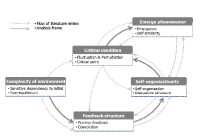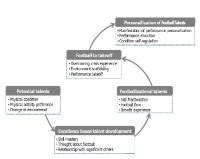
Purpose This study was aimed at interpreting the football talent development stages based on complexity theory. Methods The data for this study was gathered through literature review and in-depth interviews that were analyzed by thematic analysis. Literature review of the studies regarding complexity theory revealed the features of complexity theory and five football players participating in the K-league were interviewed. Gathered materials were analyzed by the thematic analysis. Initial codes and potential themes of football talent development stages, the conception and potential themes of the complexity theory were interpreted by metaphorical analysis. Results Results of literature review were as follows: analysis frame of complexity theory were organized environment of complexity, feedback structure, self-organization, critical condition and emergent phenomenon. The football talent development stages, interpreted as a result of literature review, were divided into Potential Talents, Excellence based Talents Development, Footballizational Talents, Football to Takeoff and Personalization of Football Talents. The stages were specifically materialized as follows: Potential Talents was materialized into physical condition, physical activity preference and change of environment. Excellence based Talent Development was materialized into skill mastery, thoughts about football and relationship with significant others. Footballizational Talents was materilized into skill fractionation, football flow and growth experience. Football to Takeoff was materialized into overcoming crisis experience, performance scaffolding and performance takeoff. Personalization of Football Talents was materialized into manifestation of performance personalization, performance evolution, condition maintenance. Conclusion Football talent development stages, interpreted by means of complexity theory, were divided into Potential Talents stage, Excellence based Talent Development stage, Footballizational Talents stage, Football to Takeoff stage and Personalization of Football Talents stage. Utilization of this study as a fundamental resource of football talents development programs and as a means to understanding football talents development is looked forward to.


PURPOSE This study sought to explore elementary school (ES) teachers' avoidance of teaching model-based instruction (MBI) in physical education (PE) lessons. METHODS An open-ended questionnaire (n=93) and three focus group interviews (FGI ) were conducted with seven ES teachers. The collected data were analyzed using grounded theory analysis procedures (Strauss & Corbin, 1997). RESULTS Accordingly, we derived a grounded theory paradigm model composed of the core phenomenon (ES teacher’s avoidance of MBI in PE lessons), causal conditions (traditional difficulties of Elementary PE lessons, mismatch between MBI and ES teachers/PE lessons, lack of experience and teacher knowledge for/in MBI), contextual conditions (complex instructor organization, powerful trend of play), intervening conditions (value orientation for fun-focused PE, misunderstanding about PE curriculum), interactive strategies (focus on screening physical activities, preparing for PE lessons with YouTube rather than teacher guide book), and results (learner inclusive effects and de-curricularization). CONCLUSIONS ES teachers’ avoidance of MBI in PE lessons is a result of several reported problems with elementary PE lessons and is likely to be a recurring problem in the future. To encourage ES teachers’ MBI in PE lessons, efforts should be made to build practical knowledge of model use in pre- and in-service teacher education.